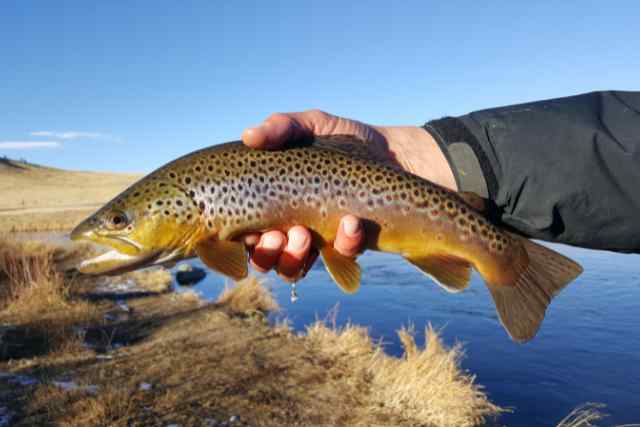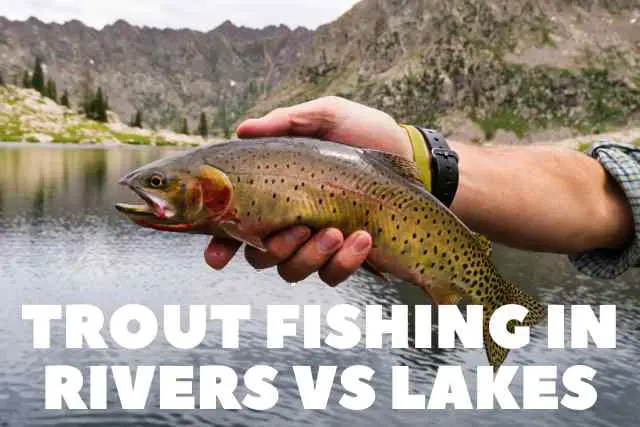Trout fishing is a popular sport for anglers of all levels, but when it comes to choosing the best spot to catch these elusive fish, the decision often comes down to rivers versus lakes. While both options offer unique advantages and challenges, the question remains: which is better?
Trout fishing in rivers offers more natural settings, varied habitats, and better opportunities for fly fishing. Lakes provide larger catches, year-round accessibility, and better conditions for boat fishing. The choice depends on personal preference, skill level, and fishing goals.

Fishing for trout is a challenging activity for many anglers, and there are many factors to consider when deciding where to cast your line. Two popular choices are fishing in rivers and fishing in lakes. Both options have their advantages and disadvantages, and each can provide a unique fishing experience.
In this blog post, we’ll explore the differences between trout fishing in rivers and lakes, and help you choose the right fishing spot for your next trip.
Table of Contents
- Trout Fishing in Rivers vs. Lakes
- Advantages of Trout Fishing in Rivers:
- Advantages of Trout Fishing in Lakes:
- Challenges of Trout Fishing in Rivers
- Challenges of Trout Fishing in Lakes
- Factors to Consider When Choosing Between Rivers and Lakes:
- Tips for Successful Trout Fishing in Rivers:
- Tips for Successful Trout Fishing in Lakes:
- Conclusion:
Trout Fishing in Rivers vs. Lakes
Trout fishing is a popular and exciting activity for anglers around the world. However, many fishermen struggle with deciding whether to fish for trout in a river or a lake.
Each option has its advantages and challenges, making it a difficult choice to make.
Over the years, trout fishing has become extremely popular around the world. I have written another article on Why Is Trout Fishing So Popular in the World? Check that article to find the reasons.
Advantages of Trout Fishing in Rivers:
Fishing for trout in rivers offers several advantages over lakes. First and foremost, rivers provide more natural settings, which can make for a more peaceful and scenic fishing experience.
Diversity and Abundance of Trout
Moreover, rivers offer more varied habitats and are home to a wider range of fish species.
This makes it a great option for fly fishing enthusiasts, as trout in rivers are more likely to be caught with this method.
Differences in Habitat and Environment
Rivers are also more likely to have cooler and more oxygenated water, which is ideal for trout. These conditions allow the fish to grow larger and more abundant in numbers, creating better opportunities for catching larger fish.
Apart from that, river fishing requires less expensive equipment and gear than lake fishing, which can make it a more budget-friendly option.
Advantages of Trout Fishing in Lakes:
Fishing for trout in lakes offers its own set of advantages. One of the biggest benefits of lake fishing is the potential for larger catches.
Catch Sizes and Limits
Lakes can be home to some of the largest trout, as they have more space to swim and feed.
Also, lakes offer year-round fishing opportunities, unlike many rivers that may be closed for certain seasons.
Lakes are also more accessible and convenient than rivers, as they can be fished from the shore or by boat.
Scenic and Recreational Value
Boating on a lake provides a unique fishing experience, as you can explore different areas and cover more water.
Lake fishing offers a wider range of techniques and equipment options, including trolling, spin fishing, and bait fishing.
Challenges of Trout Fishing in Rivers
Fishing for trout in rivers can present some unique challenges. One of the biggest obstacles is the presence of fast-moving water, which can make casting and retrieving more difficult.
Another challenge is that rivers can have more overhanging vegetation, which can lead to snagged lines and lost lures.
Rivers can also be more affected by seasonal changes and water conditions, which can impact fishing success.
For example, heavy rainfall can cause rivers to become muddy and fast-moving, making it more difficult to catch fish.
Therefore, river fishing requires more skill and experience than lake fishing, as it often demands the use of more advanced techniques.
Challenges of Trout Fishing in Lakes
Fishing for trout in lakes also presents its own set of challenges. One of the biggest obstacles is the potential for overcrowding, especially on popular lakes.
This can make it more difficult to find a good fishing spot and can lead to increased competition for fish.
Lakes can also be affected by seasonal changes and water conditions, which can impact fishing success.
For example, lakes can experience algal blooms, which can deplete oxygen levels and make it more difficult to catch fish.
Furthermore, lake fishing requires more expensive equipment and gear than river fishing, which can make it a less budget-friendly option.
Factors to Consider When Choosing Between Rivers and Lakes:
When deciding whether to fish for trout in a river or a lake, there are several factors to consider.
Personal Preference and Fishing Goals
One of the most important considerations is personal preference, as each option offers a unique fishing experience.
The type of trout you’re looking to catch can play a role, as different types of trout thrive in different environments.
Fishing Techniques and Equipment
Skill level and experience are also important factors to consider, as river fishing can be more challenging and require more advanced techniques.
Accessibility and Convenience
Accessibility and convenience can also play a role in the decision-making process.
If you’re looking for a more convenient and accessible option, lake fishing may be the better choice, as it can be fished from the shore or by boat.
Seasonal Variations and Water Conditions
Another factor to consider is the time of year and season. Some rivers may be closed for certain seasons, or have restrictions on fishing times. Lakes, on the other hand, can offer year-round fishing opportunities.
Water conditions and weather can impact fishing success in both rivers and lakes, so it’s important to check conditions before planning a fishing trip.

Tips for Successful Trout Fishing in Rivers:
If you decide to fish for trout in a river, there are several tips you can follow to increase your chances of success.
- First, try to fish during periods of low light, such as early morning or late evening, as this can be when trout are most active.
- Find areas with slower-moving water or eddies, as these are often where trout congregate.
- When fishing in a river, it’s important to use the right equipment and techniques. Fly fishing can be particularly effective in rivers, as it allows for a more natural presentation of the lure.
- Consider using smaller lures or bait, as trout in rivers may be more selective in what they eat.
- Be patient and persistent. River fishing can require more time and effort than lake fishing, but the rewards can be worth it.
- Keep trying different techniques and areas until you find the right combination.
Tips for Successful Trout Fishing in Lakes:
If you decide to fish for trout in a lake, there are several tips you can follow to increase your chances of success.
- First, try to locate areas where trout are likely to congregate, such as drop-offs, weed beds, or underwater structures.
- Consider using different techniques and equipment, such as trolling or spin fishing, until you find what works best for you.
- When fishing in a lake, it’s important to pay attention to the weather and water conditions.
- Trout may be more active during overcast or cooler days, and may move to different areas depending on the time of day.
- Finally, be mindful of the regulations and limits for the lake you’re fishing on, and practice catch-and-release whenever possible to ensure the sustainability of the fishery.
Conclusion:
In the end, the decision to fish for trout in a river or a lake ultimately comes down to personal preference and goals.
Both options offer their own set of advantages and challenges, so it’s important to consider the factors that are most important to you.
By following the tips and techniques outlined in this post, you can increase your chances of a successful fishing trip, no matter which option you choose.
It’s important to remember that fishing is not just about catching fish, but also about enjoying the experience of being out on the water or in nature.
Whether you prefer the excitement of river fishing or the tranquility of lake fishing, both options offer the chance to connect with nature and disconnect from the stresses of everyday life.
Ultimately, the best way to decide which fishing spot is right for you is to try them both out and see which one you love more.
So grab your gear, head out to your nearest river or lake, and start fishing for trout!
Just remember to follow local regulations and guidelines to ensure that you’re fishing responsibly and sustainably. Happy fishing!